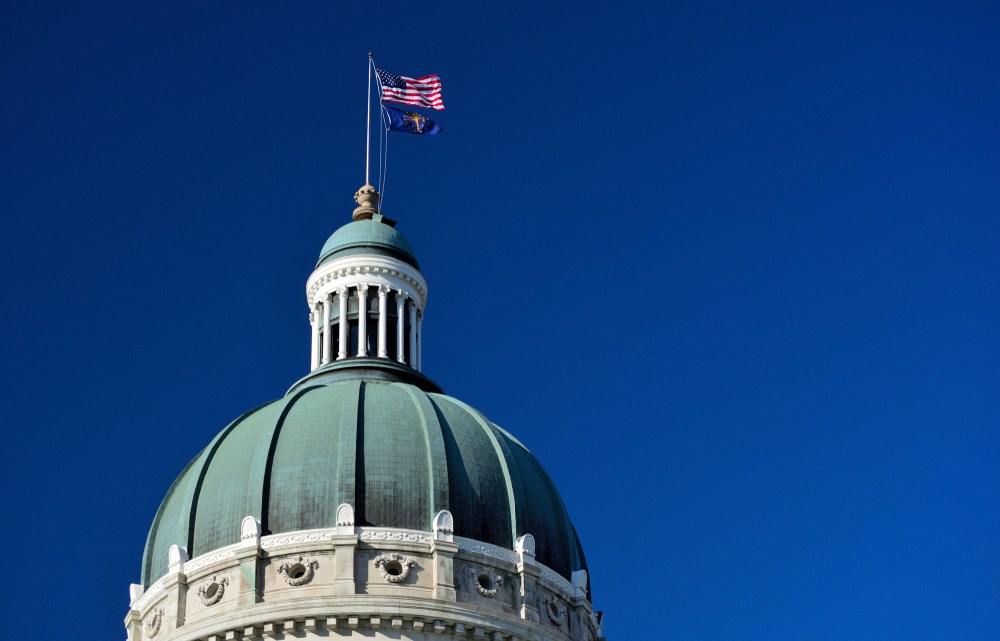by Whitney Downard, Indiana Capital Chronicle
February 6, 2024
Crucial legislative deadlines this week mark the end of the first half of the 2024 session and lawmakers made last-minute pitches to get their lingering bills to the other chamber on Monday.
After this week, the Senate will consider House bills while the House works on Senate priorities. Some of the final bills attracted lengthy discussion, such as a proposal to provide a tax break for certain child care centers, while others were more light-hearted, like one striking regulations for lemonade stands.
Other bills advancing through the process on Monday include guidance counselor duties and health care ownership transparency.
Moves in the Senate
The Senate gave the green light to new property tax breaks that Republican lawmakers believe will alleviate the state’s child care deserts and help working Hoosiers find more affordable options. Democrats argued Senate Bill 147 lacks guardrails and spending caps, and unfairly provides subsidies to for-profit companies that won’t necessarily offer care for all children in a given community, however.
The proposal advanced 39-9 along party lines on Monday and now heads to the House.
The bill seeks to make for-profit child care providers tax exempt, and provides a partial property-tax exemption for businesses that offer onsite child care for employees. There are currently 64 such on-site corporate-sponsored child care centers in Indiana, according to Indiana’s Family and Social Services Administration.
Bill author Sen. Linda Rogers, R-Granger, emphasized that “we’re trying to get people back in the workforce — and child care is very expensive.”
“There is no silver bullet that is going to fix the problem. We have to look at multiple ways to address the issue from an economic perspective,” she said. “This legislation needs to move forward in order to provide one more tool to increase affordable child care, while providing early learning opportunities for families.”
Expanded access to affordable child care is high among the Republican majority’s priorities in this year’s session. Gov. Eric Holcomb additionally laid out a plan to increase the number of child care and early education providers across Indiana in his 2024 legislative agenda.
Although Democrats said they support the intent of Rogers’ bill, they declined to support the measure.
Sen. Fady Qaddoura, D-Indianapolis, said the bill would “benefit” from guardrails to restrict the property tax exemptions to small businesses, as well as a cap on the program overall.
“If this bill is truly to help families, why does this bill not have a single clause — a single sentence — that says a portion of the tax exemption needs to go towards the tuition of these families and their kids. If this bill is to help families in Indiana hard working Hoosier families, why is not a single penny in this bill given to these families?” he asked. “My view is this policy will not help with child care. This legislation will directly benefit for-profit entities by subsidizing their for profit margins.”
Counselors
Senators also made changes to a bill that seeks to guarantee school counselors have more time to work directly with students.
As amended, Senate Bill 141, authored by Sen. Jean Leising, R-Oldenburg, extends the deadline for schools to implement minimum time requirements for counseling duties to be completed.
An earlier version of Lesing’s bill mandated counselors to spend 85% of their work time providing services by the 2025-26 school year.
Leising noted that the 80% requirement is aligned with the recommendation of the American School Counselors Association.
The bill is part of a push to combat Indiana’s school counselor “crisis” by ensuring counselors spend less time taking on roles and responsibilities outside the scope of their normal duties.
“We’ve been trying to figure out a way that we could make the school counselors that we do have more functional.
“We’ve actually made the numbers somewhat reduced to make it more flexible for our schools so that they can comply,” Leising said of the latest version of the legislation. “I think we’re taking a modest approach — I would love to say let’s do 80% next (school) year, but we can’t. I think this will get us on track to addressing the needs of school counselors … and give everybody a chance to get used to the idea.”
Actions in the House
Over in the House, lawmakers had a much shorter agenda. The final House bills to cross the finish line ran the gamut, from a pun-heavy proposal curbing regulations on lemonade stands to a requirement for health care entities to report ownership statistics.
House Bill 1019 strikes regulations for refreshment stands operated by minors serving non-dairy products, according to author Rep. Blake Johnson.
“For children all over the state, setting up a lemonade stand at the end of their driveway or with a group of friends is their first introduction to business, and it provides powerful lessons around financial literacy,” said Johnson, D-Indianapolis, in a release. “With HB 1019, we’re not only peeling back unnecessary limitations, we are helping to inspire a new generation of Hoosier entrepreneurs and future business owners.”
His puns didn’t stop there, using “zest” and “sour” in his speech.
The bill passed unanimously.
In an ongoing effort to combat high health care costs, Rep. Donna Schaibley authored House Bill 1327, a measure seeking to require health care entities — including hospitals, physician practices, pharmacy benefits managers and third-party administrators — to report a breakdown of their ownership data to the Indiana Department of Health. The agency would be required to post that information in a public-facing dashboard.
Additionally, pharmacy benefits managers and third-party administrators must allow an audit of their claims twice a year. The bill’s language comes from the interim Health Care Costs Oversight Task Force.
Four Republican legislators voted no but the proposal passed with 93 yes votes. Both bills move to the Senate for further consideration.














